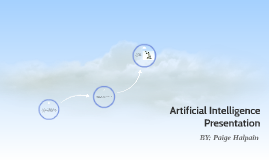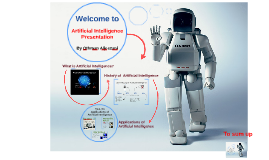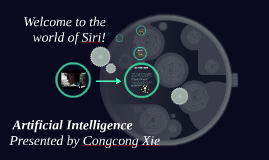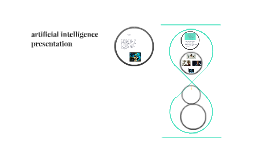Presentation: Artificial Intelligence
Transcript: AI has great benefits for human society: helping human beings doing complicated research changing people's lifestyle decreasing the cost of manufacture exploring the new spaces and do dangerous work bringing convenience to people's life. Welcome to the world of Siri! More specialized AI will be created in people's life and make a contribution to human beings in all aspects of society. My Findings reasoning, knowledge, planning, learning, natural language processing, perception and the ability to move and manipulate objects. To solve all of the problems, tools such as versions of search and mathematical optimization, logic, methods based on probability and economics are all used HARMS CITATION BENEFITS DEFINITION Third, AI can be dangerous. On one hand, AI can be harmful when they are not completed. For instance, a Tesla in self-driving mode rear-ends a blue truck because the AI consider the truck as the sky when it is blue. In this case, the program is not completed, which causes harm to users. On the other hand, when machines start to get intelligence, they might react without the direction of human beings. Second, it stops people from thinking. For example, people who use the calculator all the time are not able to do simple calculations in their minds. If people can solve all the problems by using AI technology, the habit of using shortcut would lead to mental ineptitude. In this case, people will not be able to create anything better than AI. AI is probably the last and best creation of human. Artificial Intelligence or AI is defined as human intelligence existing in machines. According to "Artificial intelligence", "a machine is considered as "intelligent" when it is able to take actions to maximize its chance of being successful in the region of Computer Science." Also, learning and problem-solving are the basic functions of AI ("Artificial Intelligence"). "Artificial Intelligence." Artificial intelligence (a)Web. Holmes, John H., et al. Artificial Intelligence in Medicine: 15th Conference on Artificial Intelligence in Medicine, AIME 2015, Pavia, Italy, June 17-20, 2015. Proceedings. 2015th ed. 9105 Vol. Cham: Springer International Publishing, 2015. Web. Jaeger, Manfred. "On the Complexity of Inference about Probabilistic Relational Models." Artificial Intelligence 117.2 (2000): 297-308. CrossRef. Web. Jennings, Nicholas R. "On Agent-Based Software Engineering." Artificial Intelligence 117.2 (2000): 277-96. Print. Kaplan, Jerry. Artificial Intelligence: What Everyone Needs to Know. New York, NY: Oxford University Press, 2016. Web. Koning, K., et al. "Model-Based Reasoning about Learner Behaviour." Artificial Intelligence 117.4 (2000): 173-229. Web. Sokolova, Marina, Peter Beek, and SpringerLink (Online service). Advances in Artificial Intelligence: 27th Canadian Conference on Trillas, Enric, Susana Cubillo, and Elena Castiñeira. "On Conjectures in Orthocomplemented Lattices." Artificial Intelligence 117.2 (2000): 255-75. CrossRef. Web. Artificial Intelligence, Canadian AI 2014, Montréal, QC, Canada, may 6-9, 2014. Proceedings. 8436 Vol. Cham: Springer International Publishing, 2014. Web. Valiant, Leslie G. "Robust Logics." Artificial Intelligence 117.2 (2000): 231-53. CrossRef. Web. Functions of AI Artificial Intelligence Presented by Congcong Xie First, the employment rate will decrease since companies need fewer labors to do the work which can easily and perfectly be done by AI. A dramatic shift is going to happen in the future society when jobs in markets are taken by AI instead of human beings.

















